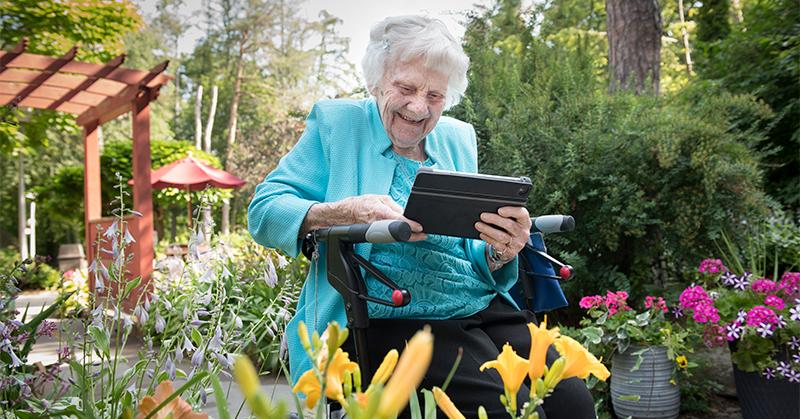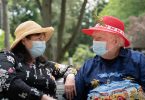Seniors fare better when they are engaged with the people in their lives. A new program at Sunnybrook is helping veterans use tablets to keep in touch with their loved ones.
(Photography by Kevin Van Paassen)
Mary Buchan Jarvis learned to drive virtually any kind of car, bus or off-road vehicle when she served as a driver in the Canadian Women’s Army Corps in the Second World War. But when her children gave her a mobile phone to help her stay in touch, Mary resisted.
“It’s just one of those things I can’t seem to get used to,” says Mary, who has been living at Sunnybrook’s Veterans Centre for about four years.
But when staff at the Centre announced a pilot program seeking volunteers to use an iPad-based communication app, Mary decided to give it a test drive. At the time, she didn’t even know what an iPad was.
“The way it was described to [me] sounded like a great idea, so I said, ‘Alright, I’m up to the challenge,’” recalls Mary, who turned 95 this year.
The mobile app, called Connections, was developed by the University of Toronto’s Technologies for Aging Gracefully Lab (TAGlab) and software company Famli.net Communications. It allows users to send text, voice, picture and video messages – all from a single interface – simply by tapping on the photos of the people they’ve added to the app. Recipients get all messages by email, regardless of whether they’re sending a text, voice memo or photo.
“We know from studies and from our work at Sunnybrook that seniors’ health, function and mood are better when they’re engaged,” says Dr. Jocelyn Charles, medical director of the Veterans Centre at Sunnybrook. “Veterans using the app are definitely more engaged, connected and enjoying a better life experience.”
The pilot program, which started three years ago with 10 participants, was expanded last year to include 40 veterans.
Sunnybrook volunteers, most of them retirees or university students, provide one-on-one and group training sessions for the veterans on a weekly basis. The majority of participants have so far reported feeling more connected since they started using the app, Dr. Charles says.
The Connections app is a step towards universally accessible communication for older people, says Robert Arn, chief technology officer at Toronto-based Famli.net, the mobile communications software company that worked with Sunnybrook and U of T on the pilot project. Robert points to TAGlab research that looked into the many communication challenges faced by older people.
“The problems are multifaceted and include issues such as accessibility – for seniors with hearing and eyesight problems, for example – and in some cases also cognitive challenges and language barriers,” Robert says.
App developers worked to create a way for people to communicate that is independent of any disabilities the users might have and that doesn’t require anyone to be particularly tech-savvy, he says. “For example, if you have poor eyesight and are sending a voice message to someone who’s hard of hearing, your message would be automatically converted to text.”
Mary’s daughter, Karen Evans, says her mother’s ability to communicate through a device she’s comfortable with has made all the difference for the entire family. Mary is even taking photos of flowers and vegetables in the Veterans Centre garden and sending them to the youngest members of the family.
“It used to be so hard to get in touch with her because she doesn’t like using her phone, but it’s been amazing the way she’s adopted the iPad,” Karen says. “It’s been a lifeline for me and for my brothers, but the absolute benefit has been for her grandchildren and great-grandchildren because now she’s maintaining email correspondence with them.”








